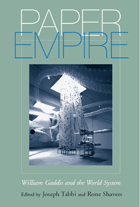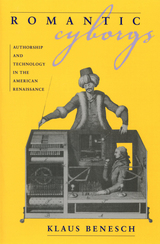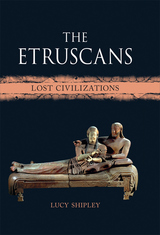2 books about Benesch, Klaus

Paper Empire
William Gaddis and the World System
Edited by Joseph Tabbi and Rone Shavers
University of Alabama Press, 2007
Celebrates and illuminates the legacy of one of America’s most innovative and consequential 20th century novelists
In 2002, following the posthumous publication of William Gaddis’s collected nonfiction and his final novel and Jonathan Franzen’s lengthy attack on him in The New Yorker, a number of partisan articles appeared in support of Gaddis’s legacy. In a review in The London Review of Books, critic Hal Foster suggested a reason for disparate responses to Gaddis’s reputation: Gaddis’s unique hybridity, his ability to “write in the gap between two dispensations—between science and literature, theory and narrative, and—different orders of linguistic imagination.
Gaddis (1922-1998) is often cited as the link between literary modernism and postmodernism in the United States. His novels—The Recognitions, JR, Carpenter’s Gothic, and A Frolic of His Own—are notable in the ways that they often restrict themselves to the language and communication systems of the worlds he portrays. Issues of corporate finance, the American legal system, economics, simulation and authenticity, bureaucracy, transportation, and mass communication permeate his narratives in subject, setting, and method. The essays address subjects as diverse as cybernetics theory, the law, media theory, race and class, music, and the perils and benefits of globalization. The collection also contains a memoir by Gaddis’s son, an unpublished interview with Gaddis from just after the publication of JR, and an essay on the Gaddis archive, newly opened at Washington University in St. Louis.
The editors acknowledge that we live in an age of heightened global awareness. But as these essays testify, few American writers have illuminated as poignantly or incisively just how much the systemic forces of capitalism and mass communication have impacted individual lives and identity—imparting global dimensions to private pursuits and desires—than William Gaddis.
In 2002, following the posthumous publication of William Gaddis’s collected nonfiction and his final novel and Jonathan Franzen’s lengthy attack on him in The New Yorker, a number of partisan articles appeared in support of Gaddis’s legacy. In a review in The London Review of Books, critic Hal Foster suggested a reason for disparate responses to Gaddis’s reputation: Gaddis’s unique hybridity, his ability to “write in the gap between two dispensations—between science and literature, theory and narrative, and—different orders of linguistic imagination.
Gaddis (1922-1998) is often cited as the link between literary modernism and postmodernism in the United States. His novels—The Recognitions, JR, Carpenter’s Gothic, and A Frolic of His Own—are notable in the ways that they often restrict themselves to the language and communication systems of the worlds he portrays. Issues of corporate finance, the American legal system, economics, simulation and authenticity, bureaucracy, transportation, and mass communication permeate his narratives in subject, setting, and method. The essays address subjects as diverse as cybernetics theory, the law, media theory, race and class, music, and the perils and benefits of globalization. The collection also contains a memoir by Gaddis’s son, an unpublished interview with Gaddis from just after the publication of JR, and an essay on the Gaddis archive, newly opened at Washington University in St. Louis.
The editors acknowledge that we live in an age of heightened global awareness. But as these essays testify, few American writers have illuminated as poignantly or incisively just how much the systemic forces of capitalism and mass communication have impacted individual lives and identity—imparting global dimensions to private pursuits and desires—than William Gaddis.
[more]

Romantic Cyborgs
Authorship and Technology in the American Renaissance
Klaus Benesch
University of Massachusetts Press
Literary critics have long regarded the rejection of technology as a distinguishing feature of American Romanticism. Yet as Klaus Benesch shows in this insightful study, the attitude of antebellum writers toward the advent of the machine age was far more complicated than often supposed. Although fraught with tension, the relationship between professional authorship and evolving technology reflected a pattern of adjustment rather than opposition, as writers sought to redefine their place within a culture that increasingly valued the engineer and the scientist. According to Benesch, major writers such as Emerson, Hawthorne, Melville, Poe, Whitman, and Rebecca Harding Davis recognized technology as a powerful engine of social change—a driving force that threatened to subordinate their creative faculties to the inexorable dictates of industrial production. In response, they conjured up "cybernetic" self-representations that attempted to preserve the autonomy of the individual author in the face of ongoing technological encroachment. These biomechanical images helped writers construct a hybrid identity that reconciled new modes of technological production with older, more organic models of professional writing. In the end, Benesch argues, Romantic literary discourse is marked as much by admiration for the technological as by strains of resentment and cultural anxiety about its negative effects. As such, it prefigures in important and previously unacknowledged ways the modernist and postmodernist sensibilities that would follow.
[more]
READERS
Browse our collection.
PUBLISHERS
See BiblioVault's publisher services.
STUDENT SERVICES
Files for college accessibility offices.
UChicago Accessibility Resources
home | accessibility | search | about | contact us
BiblioVault ® 2001 - 2024
The University of Chicago Press









